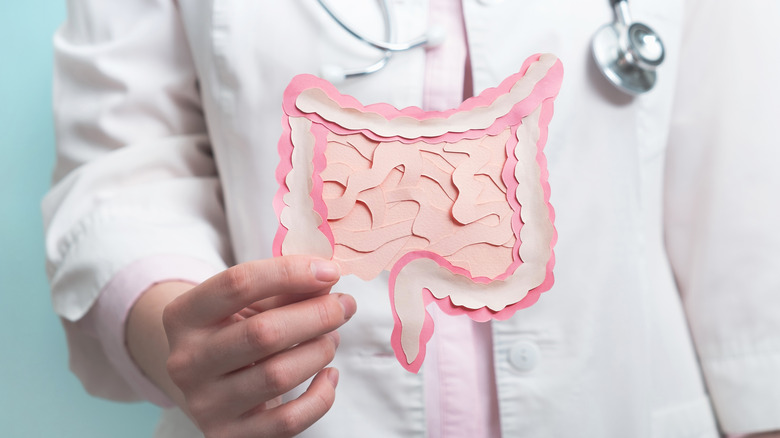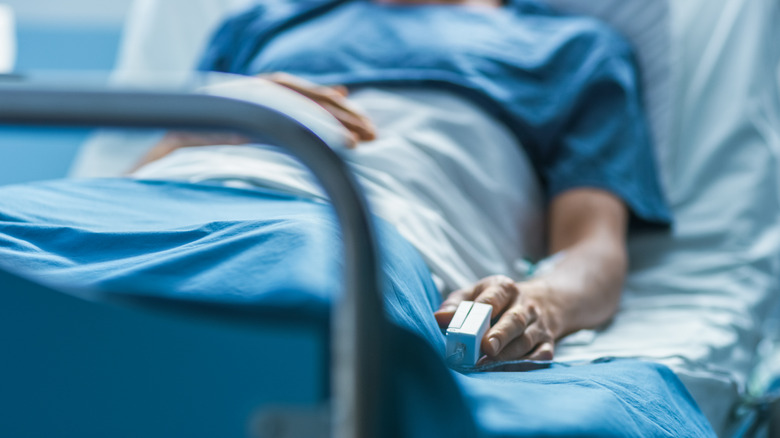This Is What Really Happens When You Get A Colonoscopy
If you've never had a colonoscopy, the whole notion of getting scoped in that region of your body may freak you out. While the procedure may sound unpleasant, it's a critical way to screen for colorectal cancer and other gastrointestinal illnesses that can be detected early and therefore managed well. In fact, the American Cancer Society attributes the lowering rate of colorectal cancer to the fact that more people are getting screened and implementing important preventative lifestyle factors. The humongous takeaway: Get your colonoscopies!
Yes, the most effective, accurate way to screen for colorectal cancers is to get a colonoscopy. But colon and rectal cancers aren't the only reason people are getting colonoscopies. About 19 million of these procedures are performed annually, according to iData Research, as they can test and detect not only cancer but ulcerative colitis, Crohn's disease, and inflammatory bowel disease, along with finding potential reasons for ongoing bowel discomfort or symptoms (via NYU Langone Health).
Who needs a colonoscopy?
The CDC encourages the general population to start getting screened for colon cancer at age 45 and at regular intervals as determined by your doctor. Certain individuals who are at high risk for developing colon cancer, like those with Lynch syndrome or other genetic predispositions, may need to get colonoscopies annually. Lynch Syndrome is a genetic condition that increases one's risk of cancer, especially colon cancer (via Mayo Clinic).
If there's a history of colon cancer in your family, especially early-onset colon cancer or colon cancer in first-degree relatives, it's important to consult with a gastrointestinal specialist or oncologist to assess your specific risk factors. Such experts may even recommend working with a genetic counselor in order to identify genetic mutations that put you and the rest of your family at an increased risk of colorectal cancer.
While it may sound scary to know you're at a higher risk of colon cancer, preventative screening measures like colonoscopies are our most effective strategy to fight cancer. Early detection has significantly higher rates of survival than cancers detected in the late stages (via CDC). Other possible ailments and conditions that may warrant a colonoscopy include persistent abdominal pain, stomach cramps, a change in bowel habits (frequency or quality), blood in stool, and unexplained weight loss, according to the CDC. Once your doctor has visibility into your gastrointestinal tract, he can better determine the cause and course of treatment.
What to expect before and during the procedure
Many who have undergone a colonoscopy report that the prep is the most challenging part of the procedure, while the procedure itself is relatively painless and easy (via Riverside Health System). In fact, you'll be sedated and likely won't remember or feel anything that happens during the procedure. After your doctors administer the sedative, they'll pass a long flexible scope with a small camera through your intestines in order to detect any abnormalities. During the procedure, your doctor will be able to remove polyps, or precancerous growths, before they have the chance to develop into cancer, according to the CDC.
To ensure your doctor has a clear view of your intestines, it's important to follow the preparatory guidelines carefully as outlined by your doctor. This means you'll likely be instructed to follow a low-fiber diet the week prior to your procedure, follow a clear-liquid diet up to 24 hours ahead of time, and cleanse the colon via over-the-counter or prescription medication (via Fight Colorectal Cancer). When in doubt about anything prep-related, always check with your doctor.



